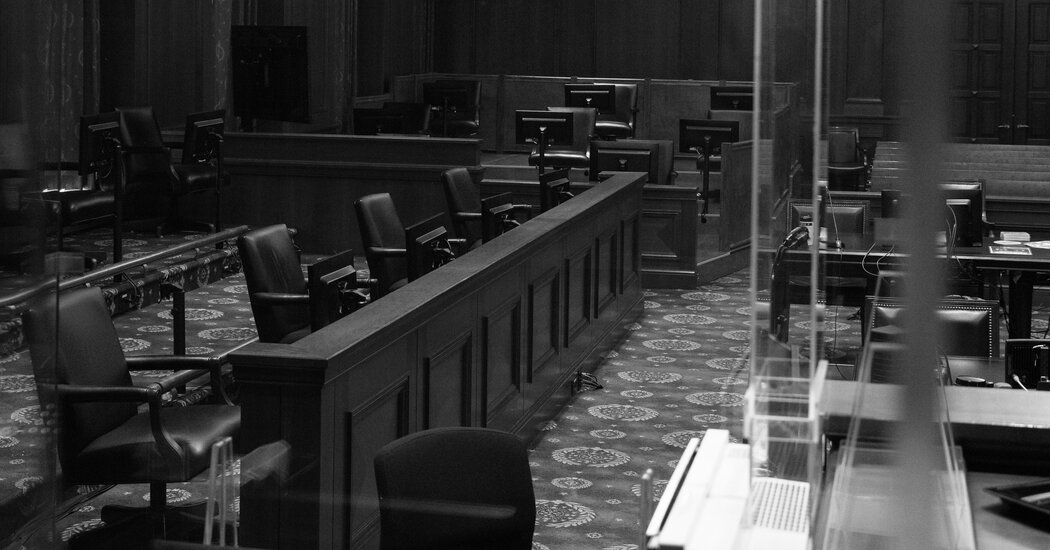A few years ago, Paul Manafort was a disgraced political operative living in a windowless cell. If Donald Trump wins in November, Mr. Manafort is likely to re-emerge as one of the most powerful people in Washington.
Because of Mr. Trump’s transactional nature and singular method of wielding power, as president, he would probably empower a small group of lobbyists who could profit from their access. Though no one elected them, these gatekeepers could exercise sweeping influence over U.S. policy on behalf of corporations and foreign governments, at the expense of regular Americans who can’t afford their services.
Rather than drain the swamp, an unleashed President Trump would return the lobbying industry to the smoke-filled rooms of the 1930s, an era unchallenged by the decades of reforms since Watergate.
And Mr. Manafort, whose career has been based on lobbying the same people he helped put in office, would be at the center. “A new Trump administration would be a bonanza for Paul,” says Scott Reed, a Republican political strategist who hired Mr. Manafort to work on Bob Dole’s 1996 presidential campaign. “Trump is the Manafort model: access at the highest levels for his clients and friends.”
A second Trump term, with the likelihood of yes-men and lackeys having more sway than political professionals and civil servants, would all but return Washington to an era when the nation’s laws were negotiated over steak dinners and golf. In the early 1970s, the leaders of a U.S. tool and die company worried about losing a Defense Department contract. They met with the era’s top lobbyist, Tommy Corcoran, who had worked in the White House for President Franklin Roosevelt and later advised Presidents John Kennedy and Lyndon Johnson.
Mr. Corcoran picked up the phone and called a Pentagon contact. After a brief exchange, he hung up. “Your problems are over,” he told his new clients. His $10,000 bill is roughly the equivalent of $75,000 today.
After Watergate, voters elected lawmakers who took federal power out of the hands of the president and congressional leaders and spread it out among legislative committees, subcommittees and other officials. That spelled the end of the Corcoran era. No lobbyist, no matter how connected or wealthy, could get anything done alone.
Over 50 years, Washington’s lobbying industry evolved from a tiny club of well-connected insiders to a sophisticated economy of P.R. gurus, social media experts, political pollsters, data analysts and grass-roots organizers. That development was encouraged by a major ethics reform law passed by Congress in 2007 that sought to diminish personal ties by prohibiting members of Congress or government officials from receiving dinners, golf outings, sports tickets and anything else of value from lobbyists.
When Mr. Trump took office in 2017, the old cozy club reasserted itself. He reconsolidated federal policymaking in the Oval Office. For lobbyists, Congress no longer mattered as much. Neither did most of the executive branch. The only person who mattered in Washington was Mr. Trump. And the most effective way to lobby him was the most straightforward: hire someone who knew him well.
America’s founders envisioned that lobbyists would work to bend government policy to their liking. In the Federalist Papers, James Madison predicted that advocates for many interest groups, which he called factions, would be equally balanced and free to compete with one another in an open market of ideas. Corporate interests would battle with organized labor. Consumer groups would face off with representatives of industry.
The way Mr. Trump seems likely to govern gives lobbyists for certain well-heeled companies and countries a huge advantage. Fewer members of Congress and government officials would have the opportunity to weigh in. The same goes for interest groups. It is unlikely to be the kind of fair fight Madison expected. Look how Mr. Trump backed off his opposition to TikTok after the Club for Growth hired his former adviser, Kellyanne Conway, to advocate for the company.
Mr. Manafort learned the value of access while working on Ronald Reagan’s 1980 election. Then 31 years old, Mr. Manafort formed a lobbying firm with Reagan aides Roger Stone and Charlie Black, which became the dominant outfit of the Reagan era. (Mr. Trump was a client.) The lobbyists created a legally separate firm to help Republicans win office. Employees of the firms had a saying: “Elect ’em on the second floor. Lobby ’em on the third floor.”
In the mid-2000s, Mr. Manafort moved the model overseas. After helping elect Viktor Yanukovych as prime minister of Ukraine in 2006 and president in 2010, Mr. Manafort made around $60 million in fees and loans from oligarchs close to Mr. Yanukovych, according to legal filings. That money train stopped in 2014 after Mr. Yanukovych was ousted from power.
Mr. Manafort returned to the United States deeply in debt and without any major source of income. In the spring of 2015 his wife, Kathy, confronted him about an affair with a woman more than three decades his junior. He broke down, begged his wife for forgiveness and checked into an Arizona sex addiction clinic.
He saw Mr. Trump’s 2016 White House bid as his path to redemption. Mr. Manafort secured a salary-free job on the team, and when the campaign manager was fired that June, Mr. Manafort got the top post.
Nearly everyone who works for a presidential campaign hopes to land a job in the administration. Instead, Mr. Manafort’s primary objective, his longtime deputy Rick Gates told us when we interviewed him for our book, was to get Mr. Trump elected so that he could use his new lobbying clout to escape his financial hole. “He was immediately thinking about how to monetize this,” Mr. Gates said.
At one point during the campaign, according to Mr. Gates, who later testified against Mr. Manafort in federal court, the would-be president approached Mr. Manafort with a question: “Hey, if we actually win this thing, what cabinet position do you want? I’ll give you anything that you want.” Mr. Manafort said he had no interest. For this inveterate political hustler, there was only one destination after a successful presidential campaign: K Street.
Things didn’t work out as Mr. Manafort had hoped, of course. He was forced to step down as campaign chairman amid a firestorm over his work for pro-Russian interests in Ukraine. As a result, he soon emerged as a central figure in Robert Mueller’s investigation into Russia’s influence on the 2016 election.
The eventual charges against him weren’t directly related to interference in the election. In 2018 he was convicted of or pleaded guilty to numerous federal counts mostly related to his work in Ukraine, including tax fraud and bank fraud, and was sentenced to more than seven years in prison.
Mr. Manafort spent a portion of his time behind bars in solitary confinement. To him, the austere living arrangement was a pressure tactic — a way for Andrew Weissmann, the federal prosecutor handling his case, to force him to turn against Mr. Trump. “He was only interested in making my life so miserable that I would gladly offer to cooperate to get out of that hellhole,” Mr. Manafort wrote in his memoir, “Political Prisoner.”
But Mr. Manafort didn’t turn against his former boss. Though he agreed as part of his 2018 plea deal to cooperate with Mr. Mueller’s investigation, whatever information he provided didn’t lead to charges against Mr. Trump. Unlike Michael Cohen, who provided testimony in Mr. Trump’s hush-money trial, Mr. Manafort refused to publicly criticize the former president.
To Mr. Trump, who prizes loyalty above all else, what Mr. Manafort did was of extraordinary value.
In December 2020, Mr. Trump pardoned Mr. Manafort for his crimes and the following day called his former campaign chairman. “You are a man,” Mr. Trump said, according to Mr. Manafort’s memoir. “You are a real man.”
The financial pressures that fueled Mr. Manafort’s K Street ambitions in 2016 are still there. His entanglement with Mr. Mueller and other prosecutors have cost Mr. Manafort about $5 million in attorneys’ fees, according to his memoir.
In early May The Washington Post reported that Mr. Trump was determined to hire Mr. Manafort for a significant position at the Republican National Convention “because he appreciates that his onetime campaign chairman has remained loyal to him even while serving in prison.”
In the end, the job offer never came. After the press ramped up scrutiny of his involvement with the convention, Mr. Manafort announced he would not have a role to avoid being a distraction. In the likely event that he resumes representing clients before the government and if Mr. Trump is elected, the president will have plenty of other ways to repay his former campaign chairman.




